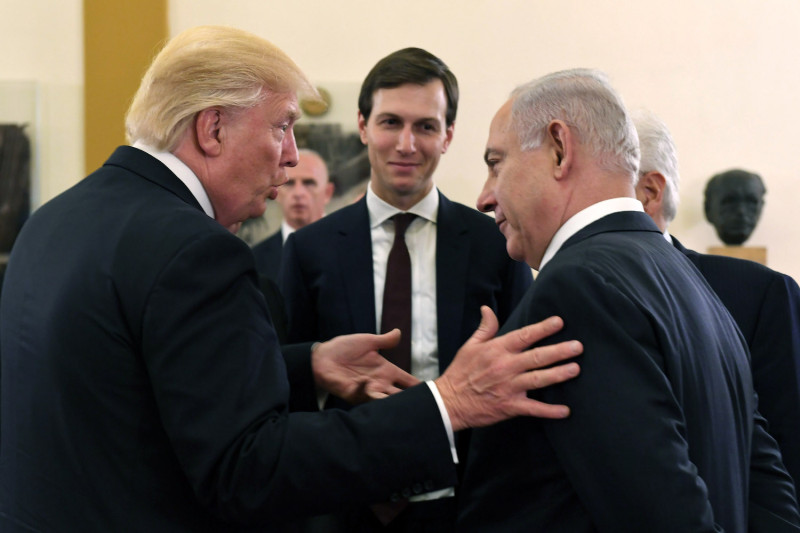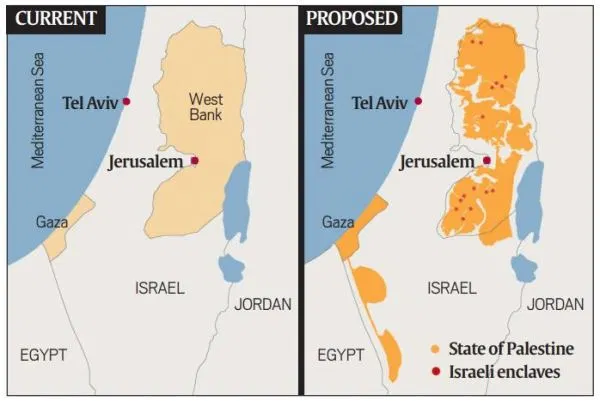US Middle East Peace Plan
2020 FEB 10
Mains >
International relations > India and Global Regions > India & West Asia

WHY IN NEWS?
The US President has unveiled Middle East Peace Plan, which is a US peace proposal to resolve the historic Israel-Palestine conflict. It has received staunch opposition from the Palestinian Authority but was praised by Israel.
|
Israel-Palestine conflict
- The Zionist movement was started by Jews to escape varied persecution and establish their own ancestral homeland according to Jewish scriptures, Israel. The Israeli-Palestinian conflict has its roots in the late 19th century when Jews fleeing anti-Semitism in Russia and central Europe began emigrating to Palestine.
- In 1917, during World War I the British capture Palestine from the Ottomans and issued the Balfour Declaration.
|
The Balfour Declaration was a public statement issued by the British government in 1917 during the First World War announcing support for the establishment of a "national home for the Jewish people" in Palestine, then an Ottoman region with a small minority Jewish population.
|
- Opposition from the Palestinians first emerges at a congress in Jerusalem in 1919.
- In 1922, the League of Nations sets out the obligations of a British mandate in Palestine including securing "establishment of the Jewish national home", the future Israel.
- Britain crushed the great Arab revolt in Palestine of 1936-1939.
- Palestine was partitioned into Jewish and Arab states under United Nations Resolution 181, approved in 1947 and Jerusalem put under international control.
- In the split, the West Bank including east Jerusalem was given to Jordan and the Gaza Strip to Egypt.
- The state of Israel was finally created on May 14, 1948, provoking an eight-month war with Arab states.
- More than 400 Palestinian villages were razed by Israeli forces and around 760,000 Palestinian refugees fleed to the West Bank, Gaza and neighbouring Arab countries.
- The Palestine Liberation Organisation (PLO) is created in 1964.
- In the Six-Day War in June 1967, Israel defeated Egypt, Jordan and Syria and occupied east Jerusalem, the West Bank, the Gaza Strip and the Golan Heights.
- Jewish settlement of the occupied territories starts shortly afterwards and continues in the West Bank, east Jerusalem and the Golan Heights today.
- Arab states attacked Israel on October 6, 1973, the Jewish holy day of Yom Kippur, but Israel repelled the attack.
- Israel invades civil war-wracked Lebanon on June 6, 1982, to attack Palestinian militants after initially sending in its forces in 1978. Israeli-backed Lebanese militias kill hundreds of Palestinian refugee camps in Beirut.
- The first intifada or Palestinian uprising against Israeli rule, raged from 1987 to 1993.
- PLO leader Yasser Arafat returns to Gaza in July 1994 to create the Palestinian Authority. Self-rule is established for the first time in the Gaza Strip and the West Bank town of Jericho.
- In September 2000, right-wing Israeli opposition leader and future prime minister Ariel Sharon visits the Al-Aqsa mosque compound in east Jerusalem, a site holy to Muslims and Jews, who refer to it as the Temple Mount, sparking the first clashes of the second intifada.
- Responding to a wave of suicide bombings, Israel in 2002 invades the West Bank in its largest operation there since the 1967 war.
- Moderate Mahmud Abbas takes over the leadership of the Palestinian Authority in January 2005, after the death of Arafat.
- The last Israeli forces leave Gaza after a 38-year occupation in September 2005.
- In June 2007, Islamist movement Hamas seizes control of the Gaza Strip after ferocious fighting with its rivals in the Fatah faction led by Abbas, who remains in power in the West Bank.
- Hamas and Fatah sign a reconciliation accord in October 2017 aimed at ending a decade of discord.
|
Palestinian demand
- Israel to withdraw to pre-1967 borders and establish independent Palestine state in West Bank and Gaza.
- Israel should stop all expansion of settlements before coming to peace talks.
- Palestine wants Palestine refugees who lost their homes in 1948 be able to come back.
- Palestine wants East Jerusalem as the capital of Independent Palestine state
Israel’s demand
- Jerusalem as the undivided sovereign capital of Israel.
- Recognition of Israel as a Jewish State. Also, expansion of its area although not directly stated.
- Palestine refugees be permitted back only to Palestine and not to Israel
US MIDDLE EAST PEACE PLAN
Key Points from the Plan
- The Plan demands Jerusalem to be undivided Capital of Israel and Capital of Palestine to occupy far-flung eastern neighborhood beyond an existing security barrier. It proposes such area chosen by Palestinians to be named as Al Quds, the Arabic name for Jerusalem.
- Israel need not uproot any settlements and can incorporate the vast majority of Israeli settlements into contiguous Israeli territory. Also, Israeli enclaves located inside contiguous Palestinian territory will become part of the State of Israel and be connected to it through an effective transportation system.
- Palestinians can have a US-recognised quasi sovereign state which will not have a standing army. They will also have to give up violent resistance to Israel and ensure the disbandment of Hamas which governs Gaza.
- The plan says the Jordan Valley - which is considered critical for Israel’s national security will be under Israeli sovereignty.
- Israel would freeze further settlement activities on the West Bank for four years — the time for negotiations. During this period, the Palestinian Authority should dismiss its current complaints at the International Criminal Court against Israel and refrain itself from taking further actions. It should also crack down on “terrorist” groups such as Hamas and the Islamic Jihad.
- The plan claims to facilitate more than $50 billion in new investment over 10 years and transform the West Bank and Gaza. It includes constructing essential infrastructure including high-speed transportation links between the West Bank and Gaza, promoting private sector growth, upgrading education, and improving the healthcare sector and the overall quality of Palestinian life.

|
Status of Jerusalem
- According to the Plan, Jerusalem will not be divided and will remain sovereign capital of State of Israel.
- Jerusalem’s holy sites should remain open and available for peaceful worshippers and tourists of all faiths.
|
Major criticism against the West Asia Peace Plan
- Many observers have criticized the deal which was drawn up in favour of Israel without any meaningful Palestinian participation. US back in 2017, recognized Jerusalem as the Capital of Israel and plans to move its embassy there.
- The US President faces severe criticism even from the opposition of his country who accuses the plan to be unacceptable and sham.
- Another issue with the declaration of this plan is that in any future negotiations the Palestinians will have to begin with a disadvantage and be forced to hold ground.
- The Palestinian refugees who were forced out from their homes during the 1948 Arab-Israeli war that followed the declaration of the state of Israel would not be allowed to return. They could move to the future Palestinian state, be integrated into the host countries or settled in other regional countries.
|
India’s perspective
Israel
- India was a vocal proponent for the cause of Palestine homeland. It was after the 1990s official engagement took place and bilateral relations initiated. During the Kargil War Israel extended unilateral assistance and marked the deepening of defense ties.
- Even then India maintained the Palestinian cause and supported the need for an amicable two-state solution. New Delhi was a pro-active supporter of Palestine in UN and backed its resolutions.
- India citing its pragmatism in Foreign policy stance has been improving its ties with Israel. The PM visit to Israel and economic, defence ties and cooperation in agriculture can be seen in this regard. Also, India abstained from UN resolutions censuring Israel on the Palestine during the 2017 period.
- India’s ties with Israel has been improving lately:
- Defense: India is one of the top arms supplier for India
- Counter-terrorism: There is a joint-working group on counter terrorism between the nations
- Agriculture: Israel’s technology has benefited India in agriculture like in mechanization, protected cultivation, micro-irrigation etc
- Water-management: India has been seeking Israel’s assistance in desalination technology, water management and conservation.
- Also, there is a considerable Indian diaspora in living in Israel from Maharashtra (Bene Israelis), Kerala (Cochini Jews) and Kolkata (Baghdadi Jews).
Palestine
- In 2018, Indian PM became the first Indian sitting Prime Minster to make an official visit to Palestine to bolster long-standing political and economic ties. He landed at the Palestinian Authority's presidential headquarters in Ramallah.
- Despite India's history of supporting the Palestine's cause, no Indian prime minister has ever visited the country before.
- Agreements were signed for setting up of a super specialty hospital in Beit Sahur and construction of a centre for empowering women. Also, some memorandums were signed.
- India voted at the United Nations along with 127 other nations against US President Donald Trump's decision to recognize Jerusalem as the capital of Israel.
|
India reiterated that the final status should be resolved through direct negotiations between the two nations. And urged the parties to engage with each other, including on the recent proposals (Middle East Peace Plan) put forward by the US and find an acceptable two-state solution.
|
|
WAY FORWARD:
- Both Israel and Palestinians make non-negotiable claims over Jerusalem.
- The Fatah party of President Mahmoud Abbas runs the Palestinian Authority on the West Bank and Hamas runs Gaza. While there’s a bitter feud between these two, both sides as well as others related to Palestinians have come together in rejecting the Trump plan.
- The Palestine position, which is backed by most of the world powers, is the formation of an independent, sovereign Palestinian state based on the 1967 border (meaning the whole of the West Bank and the Gaza Strip) with East Jerusalem as its capital (including the Old City that houses Haram esh-Sharif, also known as Temple Mount, a holy site for both Muslims and Jews).
- After the plan was unveiled, UN reaffirmed that it is committed to supporting Palestinians and Israelis resolve the conflict on the basis of UN resolutions, international law and bilateral agreements.
- Trying to carve out a new Capital in Jerusalem by eviction of Palestinian will be detrimental for both sides. Only a negotiated two-state solution, acceptable to both sides can lead to a lasting peace between Israelis and Palestinians. Until then maintaining a status-quo is favorable for both states.
- Also, a peaceful middle east is in the interest of India as 70% of our oil imports come from the region and more than 8 million Indians work in these regions
Practice Question
Q.The US administration has unveiled the ‘Middle East Peace Plan’. What are the important proposals of the Plan? How should India respond to the proposal?

